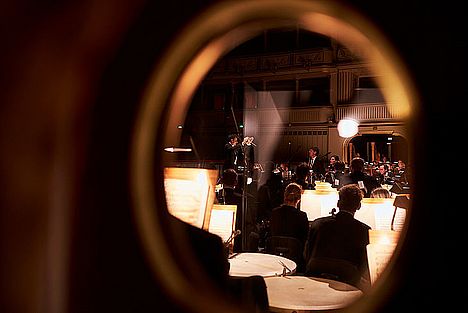
PHILIPPE JORDAN ON THE NEW MOZART CYCLE
Opera houses and artists always keep coming back to Mozart's Da Ponte operas. Why to them exactly?
Because these three works are central not only within the Mozart repertoire, but in general within the entire opera repertoire. Everything is measured against them: they are the starting point and the foundation stone, and therefore have to be worked on over and over again, and questioned anew - musically as well as scenically. With Don Giovanni we are starting a journey, the effects of which may have the potential to influence the entire repertoire.
Is there a unique special feature of Don Giovanni within the entire (Mozart) repertoire, an aspect that does not appear in the other two Da Ponte operas?
In Don Giovanni the characters stand even closer to the abyss than in the other two Da Ponte operas. It is the first really great opera that points in the direction of Verdi and Wagner. Mozart now crosses a boundary here that he still kept with Le Nozze di Figaro. In Don Giovanni he sets forth an impulse that not only leads his development to a high peak, but also influences what is to come: Die Zauberflöte, Fidelio, Freischütz, Holländer and Ring des Nibelungen - they are all a result of Don Giovanni. You notice it, for example, in the orchestral part: it requires much more technical effort and more commitment on the part of each individual musician.
In your first answer you spoke about the necessity to regularly question works anew: Does that mean that every era has its own truth? Or is there - musically speaking - something timelessly "absolute"?
For me personally, the truth lies in Mozart himself. I keep coming back to this foundation, reading the text carefully, avoiding large, added ornaments, appoggiaturas, mannerisms. One shouldn't forget that Mozart's emotions are very pure, direct and undisguised - the less you add, the more vividly they speak to us from the stage. In short: less is more. At the same time, it is the case today - also with Mozart – that almost everything is possible and can be done. The exciting thing about an international ensemble like the one at the Vienna State Opera is that, although the artists come from all corners of the world, from a wide variety of schools and traditions, you still have to find a common denominator. A common answer.
This is a challenge for an ensemble: one should not just think about a local group of singers, but bigger and wider. I am not interested in a precisely defined number or a specific affiliation to a house. Rather, it is about a common spirit and musical intelligence: how do you deal with the text? With the recitatives? Can you find a language, an expression? To limit yourself to just a beautiful sound is not enough for me. It has to be about getting together and fitting together to find a consistent collaboration and a more long-term dimension. The time factor is also important: one shouldn't think in terms of individual seasons, but rather more broadly and with a wider horizon.
Don Giovanni is an opera buffa, a cheerful opera. Can the dramatic parts of the score also be read from this point of view?
No, because the greatest comedies in particular always have enormous depth, just think of Falstaff or the Meistersinger. Just as Le Nozze di Figaro also has its abysses. Don Giovanni is undoubtedly a black comedy, a nocturnal piece, that plays within the dark shadows. It can get dramatic! The Don Ottavio singer at the world premiere, Antonio Baglioni, was the first to sing the title character in La clemenza di Tito four years later. Today these parts are often viewed as vocally very far apart.
Has a »pigeonhole thinking« developed here that was not intended by Mozart?
It always depends on the singer, even today there are tenors who sing both parts at the same time. In principle, Mozart was very open, for example he did not divide into soprano and mezzo-soprano, but only wrote soprano. I always demand greater flexibility in this area and not rigid categorical thinking. A Susanna must be able, in a few years of course, to sing a Fiordiligi and then a Countess Almaviva. A Dorabella can be a soprano or a mezzo, likewise a Donna Elvira. My dream is to have two singers alternate between portraying Leporello and Giovanni in a series of performances, not as a gag, but because these two characters are two sides of the same coin, and not only in the second act when the two characters trade roles. To depict this through casting evokes a dramaturgical brilliance. It can go even further: a Susanna should grow up to become a Tatjana, soon she may sing Mimì, Elsa or Desdemona. All of this is possible as long as the Mozart foundation is right, to which one should always return. An Iago must be able to sing a Figaro - a Hans Sachs, the Count Almaviva.
Does that also apply to conductors? This obligation to return to Mozart again and again?
Of course! This applies to singers, conductors, instrumentalists - and also directors.